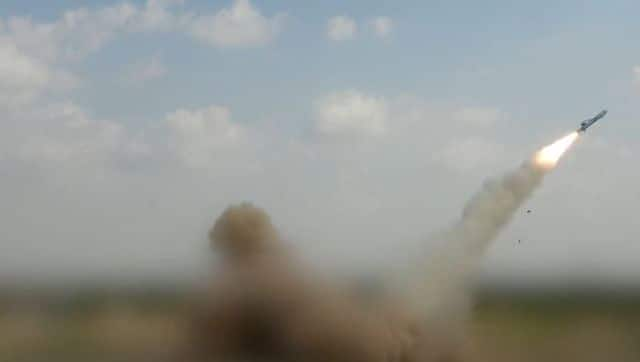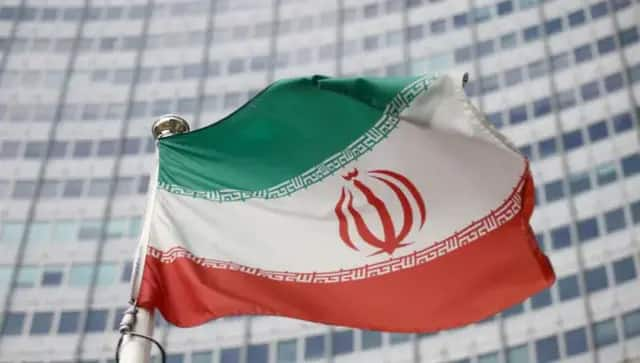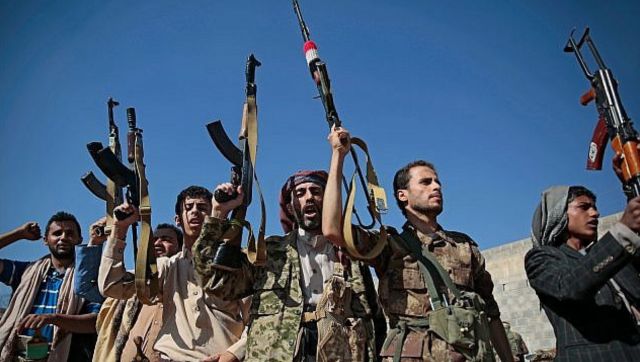Yemen’s Houthi rebels have claimed to have attacked Israel with drones and ballistic missiles. The development of the Houthi rebels, backed by Iran, entering the fray only raises the risk of the Israel-Hamas conflict widening into a region wide conflagration. But what happened exactly? And who are the Yemeni rebels backed by Iran? Let’s take a closer look: What happened? The Houthis said they launched a “large number” of ballistic missiles and drones towards Israel, as per Al Jazeera. The outlet quoted Houthi military spokesperson Yahya Saree as saying this was their third operation against Israel.
Saree warned of more attacks “until the Israeli aggression stops.”
″Our armed forces launched a large batch of ballistic missiles and a large number of drones at various targets of the Israeli enemy,” Saree said in a televised statement. “The Yemeni Armed Forces confirm that this operation is the third operation in support of our oppressed brothers in Palestine and confirm that we will continue to carry out more qualitative strikes with missiles and drones until the Israeli aggression stops.” Saree did not identify the specific weapons used in the attack. However, the use of the arrow suggests it was a ballistic missile. The Houthis have a variant of its Burkan ballistic missile, modeled after a type of an Iranian missile, believed to be able to reach over 1,000 kilometers to strike near Eilat. On Tuesday, Israel said its fighter jets and its new Arrow missile defence system took down two salvos of incoming fire hours apart as it approached the country’s key Red Sea shipping port of Eilat. [caption id=“attachment_13330122” align=“alignnone” width=“640”] After Houthis claimed they launched a “large number” of ballistic missiles and drones towards Israel, the Yemen forced joined in. X/@army21ye[/caption] “All aerial threats were intercepted outside of Israeli territory,” the Israeli military said. “No infiltrations were identified into Israeli territory.” The Houthis earlier this month had been suspected of an attack targeting Israel via missiles and drones over the crucial shipping lane of the Red Sea. The US Navy downed the missiles and drones. Who are the Houthi rebels? The Houthis are a minority in Yemen. They follow the Shiite Zaydi faith, a branch of Shiite Islam that is almost exclusively found in Yemen – and which is radically different than the Shiite Islam in Iran, Iraq, and Lebanon.
After Houthis claimed they launched a “large number” of ballistic missiles and drones towards Israel, the Yemen forced joined in. X/@army21ye[/caption] “All aerial threats were intercepted outside of Israeli territory,” the Israeli military said. “No infiltrations were identified into Israeli territory.” The Houthis earlier this month had been suspected of an attack targeting Israel via missiles and drones over the crucial shipping lane of the Red Sea. The US Navy downed the missiles and drones. Who are the Houthi rebels? The Houthis are a minority in Yemen. They follow the Shiite Zaydi faith, a branch of Shiite Islam that is almost exclusively found in Yemen – and which is radically different than the Shiite Islam in Iran, Iraq, and Lebanon.
As per Indian Express, the Zaydis ruled Yemen until a civil war broke out in 1962 – after which they were sidelined.
As per CFR, the group has its origins in a movement that began in the late 1980s in the north of the country to safeguard and bring back Zaydism. As per The Guardian, this came in the backdrop of the Zaydis being isolated as Salafist Sunni ideology gained ground in Saudi Arabia – which then disseminated the ideology across the 1,300 kilometre border. It was then that Zaydi clerics began urging their faithful to take up arms against Saudi Arabia. The Houthis first delved into politics under Hussein Badreddin al-Houthi – who opposed the Iraq war in stark contrast to the then Yemenese president Ali Abdullah Saleh. Hussein was killed by Yemeni soldiers in 2004 – the same year that the Houthis first began taking on the state in 2004. As per The Guardian, the Houthis over the years slowly gained ground outside their traditional northern strongholds. After Saleh lost power, they withdrew from talks to create a new government. Then, in 2014, they joined forces with Saleh and managed to take control of Sanaa – the country’s capital. By 2015, they’d ousted then president Abd Rabbu Mansour Hadi. CFR quoted April Longley Alley, a Dubai-based researcher at the International Crisis Group, as calling them a ‘victim of their own successes.’ In 2018, the Houthis would kill their foe-turned-friend Saleh out of fear that he would once again switch sides. Their slogan has long been: “God is the greatest; death to America; death to Israel; curse the Jews; victory to Islam.” As per Brookings, the group’s official name is Ansar Allah – meaning ‘supporters of God’. The Houthis have long been long backed by Saudi Arabia’s regional rival Iran – which also sponsors Hamas and the Lebanese Shiite militia group Hezbollah, which continues to trade deadly cross-border fire with the Israelis. [caption id=“attachment_13220822” align=“alignnone” width=“640”] Iran has longed backed the Houthi rebels who they see as a bulwark against their regional rival Saudi Arabia. Reuters[/caption] A piece in Brookings noted that Hezbollah has long been an inspiration for the Houthis. “Although different kinds of Shiites, the two groups have a natural attraction. Hezbollah provided inspiration and expertise for the Houthis. Iran was a secondary source of support, especially since the Houthis and Iranians share a common enemy in Saudi Arabia,” the piece noted. The Wilson Centre website, noting their lack of coherent ideology, called their politics “vague and contradictory” “The Houthis have always been on the outside. They’ve been a militia group that’s now starting to dabble in politics,” the website quoted Yemen expert Gregory Johnsen as saying. “And they don’t really know how to rule.” Houthis and Saudi Arabia The Houthis have been in a years-long war against Saudi Arabia – which has been of late attempting to reach a peace deal with them. The Kingdom saw four of its soldiers killed in its southern Jazan province in recent days in fighting with the Houthis, according to a report Tuesday by Bloomberg citing anonymous sources. In 2019, cruise missiles and drones successfully penetrated Saudi Arabia and struck the heart of its oil industry in Abqaiq. That attack temporarily halved the Kingdom’s production and spiked global energy prices by the biggest percentage since the 1991 Gulf War. While the Houthis claimed the Abqaiq attack, the US, Saudi Arabia and analysts blamed Iran. UN experts similarly said it was “unlikely” the Houthis carried out the assault, though Tehran denied being involved. [caption id=“attachment_12436442” align=“alignnone” width=“640”]
Iran has longed backed the Houthi rebels who they see as a bulwark against their regional rival Saudi Arabia. Reuters[/caption] A piece in Brookings noted that Hezbollah has long been an inspiration for the Houthis. “Although different kinds of Shiites, the two groups have a natural attraction. Hezbollah provided inspiration and expertise for the Houthis. Iran was a secondary source of support, especially since the Houthis and Iranians share a common enemy in Saudi Arabia,” the piece noted. The Wilson Centre website, noting their lack of coherent ideology, called their politics “vague and contradictory” “The Houthis have always been on the outside. They’ve been a militia group that’s now starting to dabble in politics,” the website quoted Yemen expert Gregory Johnsen as saying. “And they don’t really know how to rule.” Houthis and Saudi Arabia The Houthis have been in a years-long war against Saudi Arabia – which has been of late attempting to reach a peace deal with them. The Kingdom saw four of its soldiers killed in its southern Jazan province in recent days in fighting with the Houthis, according to a report Tuesday by Bloomberg citing anonymous sources. In 2019, cruise missiles and drones successfully penetrated Saudi Arabia and struck the heart of its oil industry in Abqaiq. That attack temporarily halved the Kingdom’s production and spiked global energy prices by the biggest percentage since the 1991 Gulf War. While the Houthis claimed the Abqaiq attack, the US, Saudi Arabia and analysts blamed Iran. UN experts similarly said it was “unlikely” the Houthis carried out the assault, though Tehran denied being involved. [caption id=“attachment_12436442” align=“alignnone” width=“640”] In this handout photo released on April 9, 2023 by the Houthi group’s media arm Ansar Allah, head of the Houthi’s supreme political council Mahdi al-Mashat, left, shakes hands with Saudi Arabia’s Ambassador to Yemen Mohammed bin Saeed Al-Jaber, in Sanaa, Yemen. (Ansar Allah Media Office)[/caption] Iran has long denied arming the Houthis even as it has been transferring rifles, rocket-propelled grenades, missiles and other weaponry to the Yemeni militia using sea routes. Independent experts, Western nations and United Nations experts have traced components seized aboard other detained vessels back to Iran. The reason for that likely is a UN arms embargo that has prohibited weapons transfers to the Houthis since 2014. What do experts say? That this is concerning and it risks drawing Iran further into the conflict. Thomas Juneau, a professor at the University of Ottawa who has studied Yemen for years, said. “It was just a matter of time before they would be able to do this.”
In this handout photo released on April 9, 2023 by the Houthi group’s media arm Ansar Allah, head of the Houthi’s supreme political council Mahdi al-Mashat, left, shakes hands with Saudi Arabia’s Ambassador to Yemen Mohammed bin Saeed Al-Jaber, in Sanaa, Yemen. (Ansar Allah Media Office)[/caption] Iran has long denied arming the Houthis even as it has been transferring rifles, rocket-propelled grenades, missiles and other weaponry to the Yemeni militia using sea routes. Independent experts, Western nations and United Nations experts have traced components seized aboard other detained vessels back to Iran. The reason for that likely is a UN arms embargo that has prohibited weapons transfers to the Houthis since 2014. What do experts say? That this is concerning and it risks drawing Iran further into the conflict. Thomas Juneau, a professor at the University of Ottawa who has studied Yemen for years, said. “It was just a matter of time before they would be able to do this.”
Juneau noted the rebels’ steadily advancing missile program came with Iranian assistance.
“The fact that there’s another front directly to the south raises the risk that Israel (air defenses) can be overwhelmed and then it can be that much more worrying if Hezbollah, Hamas and others launch massive missile barrages.” Al Jazeera’s Sara Khairat called the development ‘a concern’ for Israel it is already battling Hezbollah on one front. Air Force Brigadier General Pat Ryder, the Pentagon’s press secretary, acknowledged the Houthi fire targeting Israel, suggesting the rebels had missiles able to reach some 2,000 kilometers. “This is something we will continue to monitor,” Ryder said. “We want to prevent a broader regional conflict.” Iran’s mission to the UN has warned that allied militias like the Houthis could expand their operations against Israel. “The warnings from Iran regarding the initial days of the Gaza civilian casualties highlighted a concern: if these atrocities were not halted, they could incite public outrage and exhaust the patience of the resistance movements,” the Iranian mission said. “These concerns can be averted and the responsibility lies squarely in the hands of the American administration to halt the transgressions perpetuated by the Israeli regime.” With inputs from agencies
)